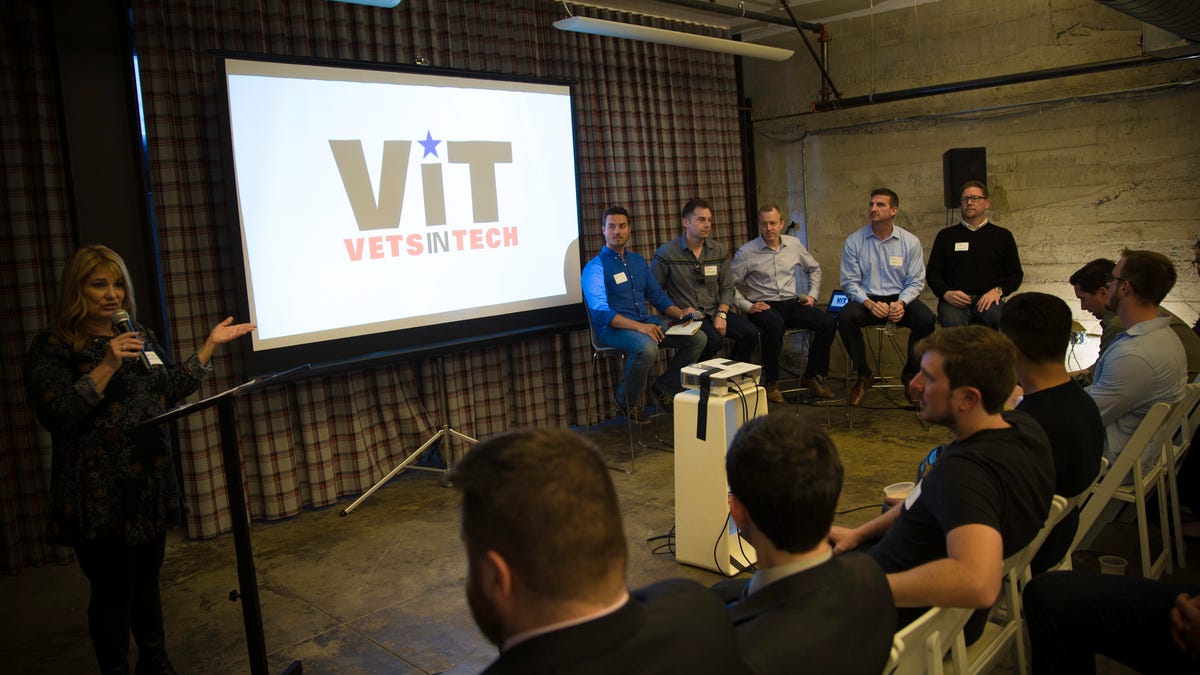Veterans bootstrap the transition from battlefield to tech
Leveraging their leadership and technology skills, vets are joining one of the fastest-growing industries.

For four years, Greg Call helped lead US Marines in war-torn Afghanistan. Now he's helping lead veterans into postmilitary professions.
The vet-turned-tech-entrepreneur oversees a program at LinkedIn designed to raise the profiles of veterans using the social network for business professionals. A typical day includes analyzing veteran member data and taking meetings with federal officials or veterans groups to increase awareness of LinkedIn's programs.
Marine Corps vet Greg Call oversees the veterans program at LinkedIn. The onetime tech entrepreneur's new mission: helping lead fellow vets into postmilitary professions including those in the tech industry.
He frequently works with Katherine Webster, who runs Vets in Tech (VIT). The San Francisco-based nonprofit helps vets get jobs at top-tier tech companies.
Call, Webster and RallyPoint, a professional social network for duty men and women in the military created by two veterans at Harvard Business School, are part of a broader effort to help American companies consider employing vets. Among common misperceptions: vets suffer from posttraumatic stress disorder, can work only in military-related fields and take orders but don't show initiative.
But there are military men and women who have experience in tech, including working with high-tech intelligence systems, satellites, robotics, drones and cyberdefense, often in stressful environments that their civilian counterparts don't have to deal with.
"They are able to thrive in organizational settings," Call said, adding that tech training in the military is becoming standard. Veterans' attention to detail, leadership and teamwork makes them appealing to tech companies, he said.
Between 2007 and 2011, an estimated 200,000 veterans transitioned each year from the military to civilian life due to retirement or completing their tour of duty, according to the Department of Defense. Also, an estimated 1.5 million veterans, many who have spent time in either Iraq or Afghanistan, will be looking for jobs within the next five years, according to the US Department of Labor. About a quarter of them will land in the tech industry, Webster estimates.
Many former soldiers, airmen, sailors and marines look for jobs, like law enforcement, that take advantage of their military training. But the transition isn't always easy. A 2014 Pew Research Center survey reported that 44 percent of post-September 11 vets, many of whom saw combat, said they had problems readjusting to civilian life, compared with 25 percent of pre-9/11 vets, many of whom served in peacetime.
Similar findings prompted Webster, a former senior manager at Sun Microsystems and the daughter of a soldier who served in the Korean War, to seek changes.
In 2012, she brainstormed with Craig Newmark, founder of the popular Craigslist website. They ended up hosting a hackathon in Silicon Valley for veterans because they wanted to take an approach different than a "lame" job fair, Webster said. The hackathon brought in 40 vets.
Webster soon created Vets in Tech, which attracted about 200 vets when it launched in 2012. The nonprofit trains veterans and connects them with Silicon Valley stalwarts, including Salesforce, Palo Alto Networks and Facebook.
Vets in Tech co-founder Katherine Webster, left, poses with VIT member Riki Tate during the Joining Forces fifth anniversary gathering at the White House earlier this month. A former US Army combat medic who served in Iraq, Tate now works at AppBuddy, a subsidiary of cloud-computing giant Salesforce.
VIT has now expanded to 10 cities nationwide, including New York, Los Angeles and Washington, DC.
"Veterans know how to apply all of the technical traits they learned on the battlefield," Webster said. "They're also not afraid of taking risks."
Ben Vickery, who attended a Vets in Tech session last week in San Francisco, agrees.
The former Marine Corps sergeant served as a linguist in Afghanistan and now works on financial automation at Google. He has some ideas he might want to apply to the "gig economy" -- think companies like Lyft and Uber -- and was looking for guidance and inspiration from vets-turned-entrepreneurs.
"I've heard so many horror stories about people who have a good idea but ruin it by not understanding when to incorporate, when to hire and when to get financing," he said.
Encouraging vets to start their own business is a priority for VIT, says Mike McNerney, an Air Force veteran who helped found Efflux Systems, a cybersecurity firm that's mostly staffed by vets.
"You must have that drive and attitude that you will not fail," said McNerney, a lawyer who also was a cybersecurity policy adviser for US defense secretaries Robert Gates and Leon Panetta. "Veterans have that desire."
Earlier this month, VIT was praised at the fifth anniversary of Joining Forces, an initiative created by First Lady Michelle Obama and Jill Biden, wife of Vice President Joe Biden, that helps vets and their spouses get jobs.
VIT was recognized as one of more than 40 tech, aerospace and telecommunications organizations committed to training or hiring more than 110,000 vets and their spouses over the next five years. Amazon plans to hire 25,000 during that time.
The strategy to hire more vets in tech and other industries is apparently working, according to a survey of more than 2.1 million veteran and military members on LinkedIn, which will be released Tuesday.
Highlights include the fact that the rate of unemployed veterans is at 3.9 percent, 1 percentage point less than the nation's overall unemployment rate and that IT is the number one industry for vets. Networking is key: Vets have 26 percent more connections than nonveterans on LinkedIn.
Also, more than 180,000 professionals who are veterans have identified themselves either as an executive, president, vice president, owner or partner of a business, LinkedIn's survey said.
Call believes this is just the beginning of more veterans joining the ranks of the employed.
"We're seeing a drastic change," he said. "Our goal is to drive that unemployment rate for veterans down to zero."
CNET's Andrew Morse contributed to this report.

